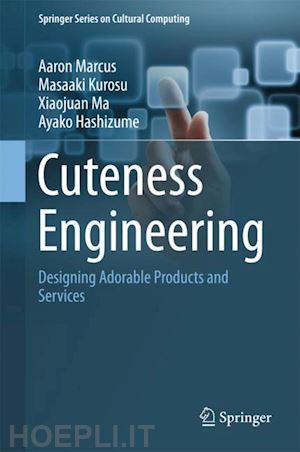

Questo prodotto usufruisce delle SPEDIZIONI GRATIS
selezionando l'opzione Corriere Veloce in fase di ordine.
Pagabile anche con Carta della cultura giovani e del merito, 18App Bonus Cultura e Carta del Docente
This state of the art monograph presents a unique introduction to thinking about cuteness and its incorporation into modern, especially computer-based, products and services. Cuteness is defined and explored in relation to user-centered design concepts and methods, in addition to considering the history of cuteness and cuteness in other cultures, especially in relation to eastern Asia.
The authors provide detailed analyses and histories of cuteness in Japan and in China, the rise of Kawaii and Moe cultural artifacts, and their relation to social, psychological, and design issues. They also attempt an initial taxonomy of cuteness. Finally, detailed interviews with leading designers of cute products and services, such as Hello Kitty, provide an understanding of the philosophy and decision-making process of designers of cuteness.
Cuteness Engineering: Designing Adorable Products and Services will be of interest and use to a wide range of professionals, researchers, academics, and students who are interested in exploring the world of cuteness in fresh new ways and gaining insights useful for their work and studies.
Masaaki Kurosu is a Professor Emeritus at the Open University of Japan, since 2017 and is an Emeritus President of HCD-Net after working as a President for 10 years. He was a professor at the Open University of Japan for 2009-2017 and was a professor at NIME for 2001-2009, a professor at Shizuoka University for 1996-2001. He was formerly working for Hitachi Ltd. at the Design Center and the Central Research Laboratory for 1978-1996. He proposed the concept of User Engineering, AET (Artifact Evolution Theory), ERM (Experience Recollection Method) and other usability/UX-related methods and concepts.
Xiaojuan Ma is an assistant professor of the Human-Computer Interaction Initiative in the Department of Computer Science and Engineering at the Hong Kong University of Science and Technology. She received her Ph.D. degree in Computer Science at Princeton University. Before joining HKUST, she was a post-doc at the Human-Computer Interaction Institute of Carnegie Mellon University, a research fellow in the National University of Singapore, and a researcher at Huawei Noah's Ark Lab. Her background is in Human-Computer Interaction. She is particularly interested in multimodal affective computing in the domain of ubiquitous, social, and crowd computing and Human-Robot Interaction.
Ayako Hashizume is an assistant professor at the Tokyo Metropolitan University since 2012. Her research interests include psychology of emotion and Kansei, engineering in relation to Human Centered Design and UX (user experience). She was awarded the kids design prospective competition 2008 from the Japan Kids Design Association, the best design prize at the design marathon 2009 from the International Association for Universal Design and the research prize 2013 from the Funai Foundation for Information Technology. She is a chief of the SIG-Kansei of HCD-Net. She received her Ph.D. in Kansei Science from Tsukuba University, Japan, in 2011.











Il sito utilizza cookie ed altri strumenti di tracciamento che raccolgono informazioni dal dispositivo dell’utente. Oltre ai cookie tecnici ed analitici aggregati, strettamente necessari per il funzionamento di questo sito web, previo consenso dell’utente possono essere installati cookie di profilazione e marketing e cookie dei social media. Cliccando su “Accetto tutti i cookie” saranno attivate tutte le categorie di cookie. Per accettare solo deterninate categorie di cookie, cliccare invece su “Impostazioni cookie”. Chiudendo il banner o continuando a navigare saranno installati solo cookie tecnici. Per maggiori dettagli, consultare la Cookie Policy.